So you’re wondering whether you should start with a mobile app vs. a website or both. Of course, in an ideal world, where budgets and time to market are not an issue, we all have mobile apps and sites, and whatnot.
- Ground Rules for Web vs. Mobile
- Native App vs. Web App
- Mobile Websites: Pros and Cons
- Mobile Apps: Pros and Cons
- Mobile App vs. Web App at a Glance
- Should You Make a Website or an App?
- When Mobile Website Was the Best Choice
- When Mobile Application Was the Best Choice
Ground Rules for Web App vs. Mobile App
Before we jump to comparing apps with websites, let’s clarify a couple of things. In this blog, I’ll talk about mobile apps vs. mobile sites, not progressive web apps (PWAs), not web apps.

Mobile apps — applications we download from app stores, regardless of how they were developed (native, hybrid, cross-platform).
Mobile site — a website optimized for viewing on mobile phones, regardless of whether it’s responsive design or adaptive, or in other words, a mobile-friendly website.
PWA — a web app that renders perfectly on mobile phones and mimics regular mobile apps.
I will not compare native applications with progressive web apps (PWAs) per se, simply because it’s a separate exciting topic we’ve covered thoroughly in a separate blog.
Related: PWA vs Native App Development
Web app — a site that performs like an application (you can do stuff with it), e.g., Gmail and ClickUp.
I will also not compare smartphone apps with classic web apps because… Well, can you imagine using an application like ClickUp (viral project management software these days) on a smartphone all the time? I mean not just for notifications and comments, but to create tasks, track time, view reports, etc.? Me neither, and that’s precisely why ClickUp started as a web app rather than a mobile app.
What I’m trying to say is it’s not about a native or web app. Typically, web-based apps precede mobile applications. Full-fledged (aka desktop- or laptop-grade) web applications and mobile applications exist in entirely different categories.
Native App vs. Web App?
To be fair, there are cases when mobile apps precede web applications. For one, Instagram was first built as an iPhone application and then developed into an accompanying web application. Same with WhatsApp, but those are rare cases.
Again, can you imagine Uber founders contemplating whether they need to start with a web app or mobile solution? It’s pretty straightforward, right? You begin with mobile because people don’t order taxis from laptops or, God forbid, desktops.
At the same time, as I’m writing this, I’ve just double-checked on Uber, and fair enough — they already have a web app (works both in desktop and mobile browsers). Apparently, it’s been around since early 2019. However, their mobile product had shipped 10 years earlier.
How do these guys know that they need to start with a mobile app rather than a website? Or how did Google know they had to build a desktop-grade web version of Gmail first?
The answer kind of hangs in the air: we build products for where our customers are. Ok, so today, mobile is the king — we’re developing for mobile. But should we be building an app or a mobile-optimized website?
I suggest we go through the advantages and shortcomings of mobile websites and native applications and figure out the answer to your mobile strategy together.
Mobile Websites: Pros and Cons
Pros
- Requires smaller development budget
There are way more web developers on the market than qualified mobile developers; plus, you don’t need to develop two separate versions: for iOS and Android.

- Maintenance and updates go swifter
Mobile sites require less effort for maintenance and updates because you’re updating a single source of code. Therefore, updating happens faster and on a lower budget compared to native mobile apps.
- No need to share revenues with Google and Apple
Google and Apple take 15% to 30% of the revenue for an app store placement, whereas with a mobile site, you own 100% of profits. In addition, you can explore virtually any monetization model.
- Allows you to reach more consumers
No need to worry about the mobile platforms and OS versions to support. A mobile site built according to the best practices will work across iOS and Android mobile browsers, no sweat.
- More immediate engagement (no need to download applications)
Mobile apps are fighting this with different features like app clips on iOS and instant apps on Android. Still, web-based mobile apps are clearly unrivaled in this respect: type in a URL, hit go, and start using.
- Simpler marketing
A site’s link is already an ad in itself. And with iOS or Android apps, you need to use QR codes, NFC tags, or other means to lure users to app stores.
Cons
- Not great when there are more than 5-7 interactive elements on the screen
Check out ClickUp in Chrome on Android. How many things do you think you can tap here before it starts to lag?
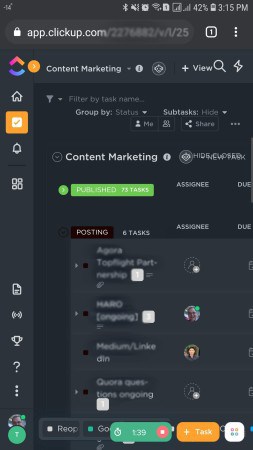
- Clunky user experience compared to native applications
Try shopping on Amazon from mobile Chrome or Safari. While that’s doable, you’ll be stuck with waiting for pages to load, content not fitting in the screen, and other intricacies of squeezing the desktop experience into a smartphone. The bottom line is mobile web applications are not that great for truly dynamic content.
- Less access to native mobile features
Read less or slower performing location, camera, file attachments; no Bluetooth, compass, augmented reality, NFC, and many other things.
- Always need an internet connection
Yes, PWAs can display some offline content, but regular mobile sites and web-based apps need connectivity to show meaningful content.
- Animations tend to be slower
This animation would be impossible in a mobile web app:
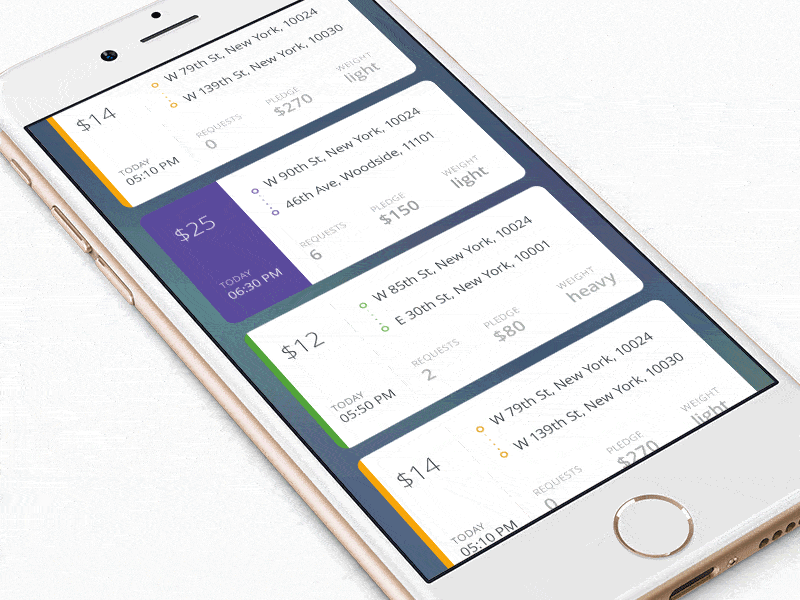
- Notifications don’t work on iOS
Users can’t receive the same notifications from iOS sites that they get from native applications.
- Customization is often limited to white and black themes
A modern site will adjust to your color palette, but that is about as far as customization goes for sites.
Mobile Apps: Pros and Cons
Pros
- Allows to reach a niche audience in the most effective way
Let’s say all practitioners at your clinic wear an iPhone. So you build a practice management application for the iPhone, and it will 100% outperform (in UX and speed) any app created with mobile web technologies.
- Full access to all features that mobile devices have
You are only limited by what each mobile OS allows you to do and your imagination.
- Better performance
Native apps especially stand out when heavy computing is going on in the background. Like adding those kitten ears during video streaming or other ML-related stuff. You just can’t have the same user experience in a mobile browser.
- On-the-go convenience
Most mobile apps can display cached content even without an internet connection. Moreover, they will automatically pull new content as soon as the connection is restored.
- Accessibility options come out of the box
Apple and Google ship quite a few accessibility features with their mobile operating systems. Therefore, developers can quickly revert to voice-over, font, and other adjustments to serve all customers better, which requires extra effort when working on a mobile site.
- More engagement potential
Native mobile apps have a large arsenal for keeping users engaged: notifications, gestures, sharing options, to mention a few.
- Great customization options
Native applications have more potential to tailor each user experience to their particular needs.
- More security options
Mobile apps offer more security with the bio-authentication and fingerprints/face recognition. However, at the same time, there’s no way to make developers use these security instruments to their full extent, and you never know how secure an application really is. With mobile websites, you get warnings when visiting harmful websites, and you see a green padlock icon when loading safe sites.
Cons
Naturally, there are inevitable TRADE-OFFs with mobile apps too, such as:
- Requires more efforts from users

Customers need to find the product in the app store and download it before they can start using it. Deep linking (a technique that opens specific screens after installation) and app clips (micro-interactions not requiring installation) solve this to a degree.
- Takes longer to update before it becomes available
Besides updating the code and uploading it to Google Play and App Store, developers need to wait for Apple and Google to approve updates. Besides, not everybody has auto-update turned on.
- Marketing is more complex
Marketing an app has indeed become rocket science. It’s not the same as sharing a link to a mobile website. However, sharing makes up for a better user experience when done natively, where you can choose how you want to share.
- Cost more to develop and support
The biggest downside is, of course, the cost of development and maintenance. New OS versions ship regularly, and you need to fully support them to keep up user engagement.
Mobile App vs. Web App at a Glance
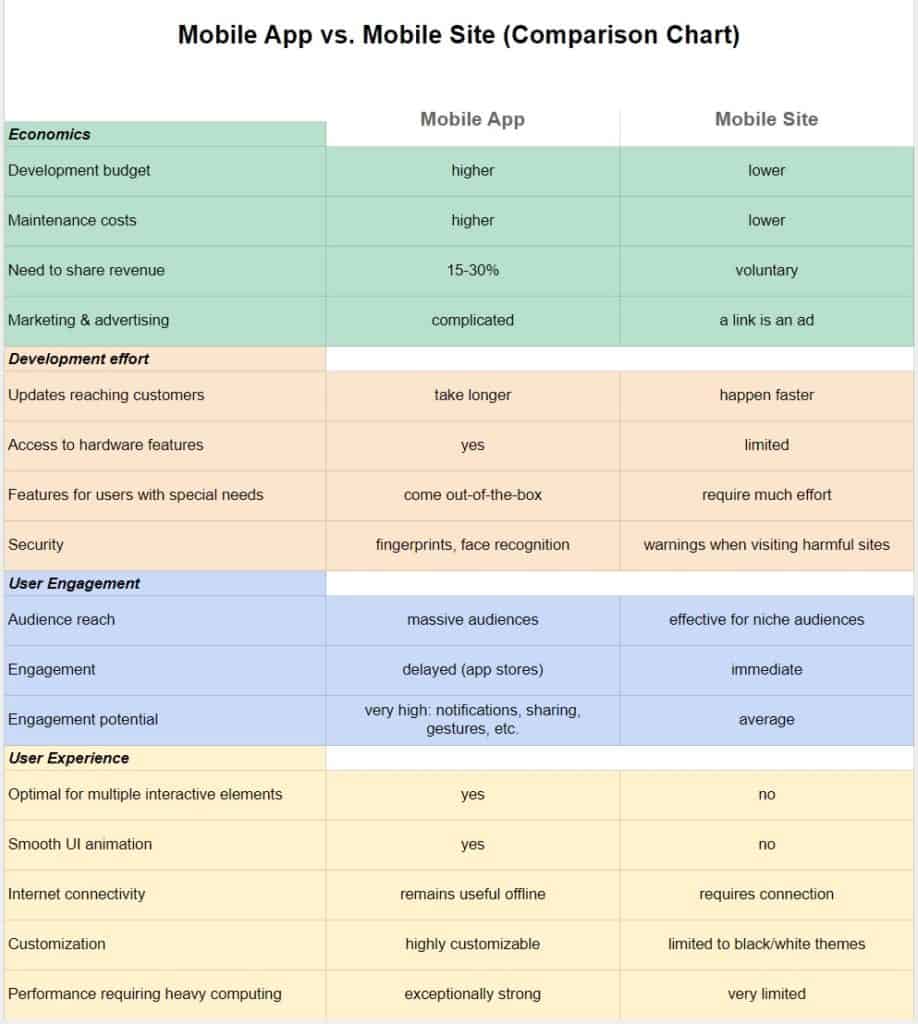
Should You Make a Website or an App?
Let’s continue with the fallacy that deploying to multiple platforms using Apache Cordova/Phonegap cuts your development time to the cost of one platform. Different platforms may have different web view renderers, and bugs may exist on one platform and not the other. You have to keep a constant watch on each platform, and if you don’t quickly address bugs on one platform, be ready to pay the price in poor reviews. Moreover, fixing platform-dependent bugs in hybrid applications can take longer than native apps due to requiring some kind of workaround.
Using hybrid technologies, optimistically, you can cut the initial build time to 75%, but when you factor in the lifetime cost, the total cost of maintaining your app becomes much pricier than most entrepreneurs are prepared for. In almost every single scenario we’ve seen, it makes more sense to start with a single platform (choose one out of web / iOS / Android) and validate your prototype first with a very soft launch and finish debugging before moving on.
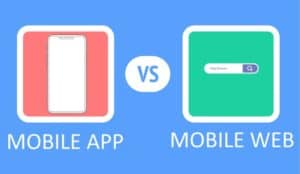
But how do you decide between a web or mobile application? The remaining questions are meant to help you answer this.
Is a core feature based on native functionality?
There are certain features within mobile applications that offer such huge advantages over the web that they tip the scales in favor of starting with a mobile solution. A few that come to mind are geolocation using the phone’s GPS, push notifications, real-time tracking, offline data storage, or integration with native tools like Google Fit / S Health / HealthKit.
Yes, it is possible to use HTML5 to tap into some of these via a browser, but you might actually end up spending more time getting it to work well in HTML5 than native. Remember that the advantage of developing a browser-accessible website is about functioning on a lot of different devices and browsers and not competing with mobile apps on native functionality.
Does creating a mobile app take advantage of a market opportunity?
I’ve seen some websites out there that would make perfect mobile apps, except the years go by, and they still don’t have one. This may be a perfect opportunity to take some version of an idea that’s already been validated, do it better, and bring it to the app store. (This begs a reminder that someone out there has already thought of your brilliant idea — winning is about execution.)
For example, maybe there’s a location-based RV parking sharing application that hasn’t hit mobile because it’s not a sexy industry. This market would be begging for a mobile app since it’s the perfect marriage of under-the-radar and the audience being entirely mobile since they’re always on the go. Creating a mobile solution here would make much more sense than a website.
Is pay-to-user rather than recurring revenue your primary monetization model?
If you’re convinced that your primary revenue will come from users paying once to unlock your app, this form of monetization is commonplace for mobile apps yet hasn’t flourished for websites. On the other hand, the web has an advantage when it comes to recurring revenue, where Apple and Android both take up to 30% of your revenue for in-app purchases and subscriptions. (Some argue that the free visibility of being in the app store gives you the visibility that makes up for the 30% loss, but your app stands a fat chance of getting featured in the app store without App Store Optimization, which basically means you still have to pay for marketing help.)
If you answered NO to all three questions above, start with a website due to lower development costs.

Just try to build the website with companion mobile apps in mind by starting with an API backend and separate frontend like Angular or React. Doing it this way is not substantially more expensive than, say, doing it entirely in Ruby on Rails, but this way, if and when you decide to build a mobile app, you can reuse the same API and maybe even some of the frontend code as well.
When Mobile Website Was the Best Choice
Let’s look at a project where we advised our customers to take the web app route.
Habitap. A browser-based habit tracking fitness and wellness app that works on smartphones, tablets, and desktops. Why did we build the app using web technologies?
- the client didn’t have time to develop two stand-alone native mobile apps
- they weren’t sure about what mobile platform their gym members used most
- the app didn’t need to access hardware features and didn’t have extensive animations
- no need to leave a cut for Apple and Google because the app serves existing gym members, and featuring it in the app stores wouldn’t necessarily bring more users.
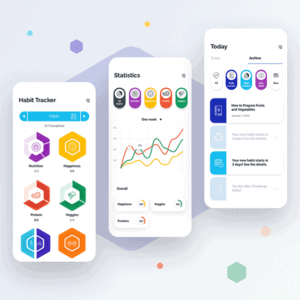
The client relatively quickly received an additional income stream by providing its gym members with a new value-add service: a habit tracking application that helps them to stay fit and healthy regardless of whether they keep coming to the gym or not.
Had they gone the native iOS or Android app route, they’d have to spend way more time and money.
Here’s the complete case study.
When Mobile Application Was the Best Choice
Here’s also a case when we built a native mobile app for the iPhone because a web experience was not an option.
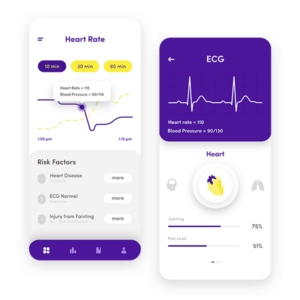
iFaint. A remote patient monitoring app helped the Stanford University School of Medicine carry out a remote patient study. Some of the reasons why we built it as a native app:
- the app tapped into GPS, specifically the iPhone’s geofencing capabilities
- we needed to integrate with Apple’s HealthKit
- patients needed to receive notifications
All of these features would be impossible to implement in a mobile website format.
Here’s the complete case study.
If you’d like our advice on what approach works best for your business case and whether you need to build an app or a website, book a meeting with one of our experts.
Related Articles:
- App Development Costs: The Complete Breakdown
- Custom Mobile App Development Guide
- App Monetization Guide
- Mobile First Design Guide
- How to Hire App Developers
- Outsourcing Custom App Development
- Native vs PWA: The Better Choice?
- Build Apps for Users Not Yourself
- Mobile App Development Trends
[This blog was originally published in January 2018, but has been updated as of February 2021]
Frequently Asked Questions
What mobile app development tools can you recommend if I want to start with a mobile app and later reuse what's possible in a web app?
React Native
Does progressive web app development belong to mobile application development?
Yes and no. You mostly do it using web technologies, though.
What do you recommend in terms of mobile web application development vs. native application if the app needs to integrate with Siri, Alexa, or Google Assistant?
Native apps will work best in this scenario.

